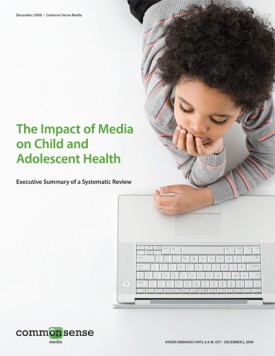Exposure to Media Damages Children’s Long-Term Health
Resource type: Research Report
Common Sense Media |
Meta-analysis shows a strong connection between media exposure and childhood obesity, smoking, and sexual activity in this report published by Common Sense Media. Common Sense Media, a grantee of The Atlantic Philanthropies.
SAN FRANCISCO, CA – Today Common Sense Media publishes a study performed by researchers from the Yale University School of Medicine, National Institutes of Health, and California Pacific Medical Center about the impact of media on children’s health. The report, Media and Child and Adolescent Health: A Systematic Review, looked at the best studies on media and health from the last 30 years and found that 80 percent of them showed that greater media exposure led to negative health effects in children and adolescents.
“This review is the first ever comprehensive evaluation of the many ways that media impacts children’s physical health,” said Ezekiel J. Emanuel, M.D., Ph.D., National Institutes of Health and lead researcher on the study. “The results clearly show that there is a strong correlation between media exposure and long-term negative health effects to children. This study provides an important jumping-off point for future research that should explore both the effects of traditional media content and that of digital media –– such as video games, the Internet, and cell phones –– which kids are using today with more frequency.”
The meta-analysis looked at 173 studies that examined media exposure’s connection to seven different health outcomes, including tobacco use, sexual behavior, obesity, ADHD, academic performance, and drug/alcohol use. The strongest relationship was found between media and obesity. Of the 73 studies that examined the relationship between screen time and childhood obesity, 86 percent revealed a strong relationship between increased screen time and obesity.
“Media is increasingly pervasive in the lives of children and adolescents,” said James P. Steyer, CEO and founder of Common Sense Media. “Parents and educators must consider the effects of media when they’re trying to address issues with their child’s health. This report makes it clear that we need a bold new agenda on media and technology use. We hope this report will create a new sense of urgency in that regard.”
The recommendations from the study urge parents to place limits on the amount of media their kids consume, as well to make smart, age-appropriate choices. Educators should implement media literacy programs in their schools, and policymakers need to make media education programs a national priority.
“The new administration has shown a commitment to children and has already made important statements about how it will focus new attention on technology and media,” said William E. Kennard, former chairman of the Federal Communications Commission and founding board member of Common Sense Media. “There is a unique opportunity to make real change in the role that media plays in our children’s lives.”
The following versions of the study are available for download:
Executive Summary
Full Report Text
Tables
About Common Sense Media
Common Sense Media is the nation’s leading nonpartisan, nonprofit organization dedicated to improving the impact of media and entertainment on kids and families. Common Sense Media provides trustworthy ratings and reviews of media and entertainment based on child development criteria created by leading national experts. For more information, visit www.commonsensemedia.org.
